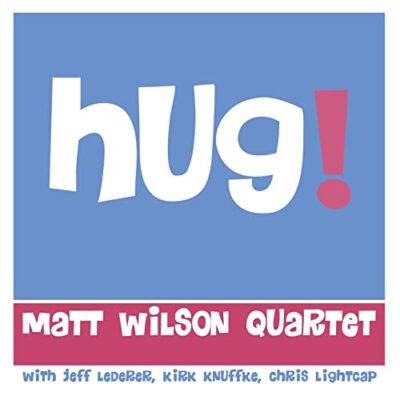Matt Wilson Hug
Matt Wilson
Hug
Palmetto
A few weeks ago, fellow drummer Jeff Cosgrove brought us a trio album, History Gets Ahead of Itself, from one of his main inspirers, Matt Wilson. Saxophonist Jeff Lederer, a mainstay of Wilson’s quartet appeared on that album as he does here, along with Wilson’s other long-running bandmates, cornetist Kirk Knuffle and bassist Chris Lightcap. This is one of the hardest working units in jazz, very explorative and improvisational. Familiar melodies such as (believe it or not) Roger Miller’s “King of the Road” and strains of Sonny & Cher and Hugh Masakela sit alongside free jazz romps and odes to artists such as Sun Ra, Gene Ammons, Dewey Redman and Abdullah Ibrahim. “We’ve worked together so much and Hug really represents the value of keeping the same people in a band and that great sharing that happens in the group,” Wilson says. “The band is the template more than the material. Hug is about what four people can do with new music or a tune by Dewey Redman or Abdullah Ibrahim. Jeff, Kirk and Chris have all been in the group so long they’ve really evolved and grown into such identifiable musical characters.”
It makes for one of the most eclectic, interesting, and unpredictable jazz efforts in recent memory, which is not surprising given Wilson’s track record. Wilson’s last album, Honey and Salt: Music Inspired by the Poetry of Carl Sandburg (Palmetto), was widely hailed as one of the year’s best releases. The Jazz Journalist Association named it their 2018 Record of the Year and Wilson was also the JJA’s Musician of the Year. Yet, this one takes a different tact.
As if a cynical shrug to the title evoking sentimental affection, Hug opens with Gene Ammons’ feisty tenor battle blues “The One Before This,” a piece that often featured prominently in his cutting sessions with Sonny Stitt. Here, of course it’s the front line of Lederle and Knuffle dueling with jagged phrasing and off-kilter harmonic choices exemplifying Wilson’s quartet’s freewheeling tendencies. And, it immediately signals a wild ride, not exactly an album one puts on for soothing comfort before turning in for the day. But this is a unit that prides itself on unpredictability, plunging next into the joyous South African bounce of Abdullah Ibrahim’s “Jabulani.”. Introduced in 1968 by Ibrahim’s international quintet with saxophonists John Tchicai and Gato Barbieri, it’s an ideal vehicle for the quartet. Wilson says. “It’s a free bop feel that’s very different than Ornette’s sound. I love paying homage to that era of improvisers. I had a chance to play with Tchicai several times, the last time he sat in with Sifter, the trio with Kirk and Mary Halvorson. Repertoire is so important in defining who you are and where you come from musically.”
Wilson learned Charlie Haden’s “In The Moment” while making Charlie & Paul with guitarist Steve Cardenas. As the title suggests, the album centered on Haden and Paul Motian, but its origin lies with Haden’s Quartet West album. Unlike much of Haden’s ballad material, this one is full of linear, fast-moving lines and proves fertile for several Wilson drum spots. We do, however, get the awaited ballad with Wilson’s original, “Every Day With You,” a love song that gathers force and intensity without gaining speed or volume. Its power is in the singular notes, proving the quartet can go in a simple, minimalist direction too. While this one more closely approximates the album’s title than any, the next one, ““Space Force_Interplanetary Music,” comes literally from a weird place. It’s a sarcastic opine on the supposed U.S. Space Force dreamed up by the current President. Wilson created a caustic march that samples Trump’s speech while weaving his pompous words into a medley with a piece by Saturn’s own, Sun Ra “who’s also an important part of my story,” Wilson says. “Putting those two tunes together puts some joy into the other half, which desperately needs it.” It comes complete with chorus “Interplanetary” emblematic of Sun Ra’s many Arkestras. And yes, it will put a smile on your face.
It’s only fitting that Wilson include a piece from another giant, Dewey Redman, with whom he played with for years. on “Joie De Vivre,” was heard originally on Redman’s 1975 Impulse! album Coincide with bassist Sirone and drummer Eddie Moore, and here gets a fleshed-out arrangement that circles back to the bridge for a neat conclusion. Then the music gets even more impossibly interesting as his own “Sunny & Share,” filtering the 1960s pop hits “The Beat Goes On” and “I Got You Babe” through an Ornette Coleman-like lens, as Lederer’s screaming alto sounds nothing like what one associates with the pop on Sonny & Cher. But then again, Wilson is a different sort of cat as he proves forcefully with the album’s biggest surprise of all, Roger Miller’s 1965 chart-topping country hit “King of the Road” featuring some sweet Lederer clarinet and Wilson’s exquisite brush work. The song, like all of Miller’s hits, is a totem from childhood that’s kept him company all these years. “I’ve probably listened to Roger Miller’s Greatest Hits more than any other record,” Wilson says. “It’s my roots and that’s why I like swing. There’s this great 2 feel at the top with the finger snaps. Swing is in every kind of American music, and this is an important part of my story.” Yes, the New Orleans blues pianist James Booker did a great version of this same tune as have other roots folks, but this may well be the first jazz rendition of the familiar tune.
The title track adds strings and has some elements that echo the late Hugh Masekela’s “Grazing In the Grass.” “Man Bun” combines jazz minimalism with a brief phrase through a dizzying rhythmic matrix while the gorgeously melodic “Hambe Kahle (Be Well),” closes the album. It’s a piece Wilson wrote inspired by a trip to South Africa with reed maestro Ken Peplowski. On a visit to a township they heard some excellent local musicians “playing all these vamp songs with that very special sound,” he recalls. “That sound was in my head when I got back. I like to have a nice closer for a night or a set and I’m looking forward to playing it a lot more.”
Colloquially we may casually say, “this album has a bit everything” but often that’s a throwaway phrase that overestimates the breadth of the album. That’s clearly not the case here as Wilson’s quartet delivers a truly eclectic, entertaining tour-de-force.
- Jim Hynes
Discover more from Making A Scene!
Subscribe to get the latest posts sent to your email.














































